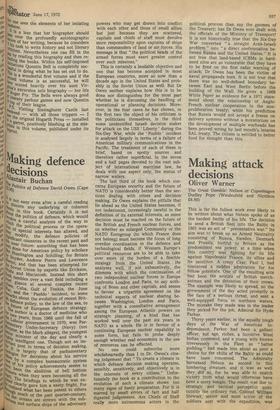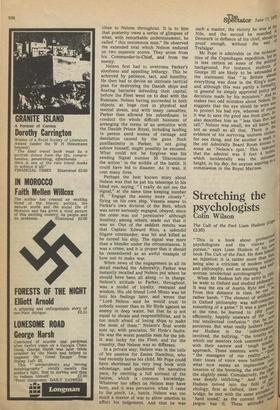Making attack decisions
Oliver Warner
The Great Gamble: Nelson at Copenhagen Dudley Pope (Weidenfeld and Nicolson £4.80) This is far the fullest work ever likely to be written about what Nelson spoke of as the hardest battle of his life. The decision to send a British fleet into the Baltic in 1801 was an act of "preventative war." Its aim was to break up an Armed Neutrality consisting of Russia, Sweden, Denmark and Prussia, hurtful to Britain as the predominant sea power, at a time when this country was fighting for its life against Napoleonic France, its allies and its satellites. A crazy Czar, Paul I, had conceived a sudden admiration for his fellow potentate. One of the resulting acts had been the seizure of British merchantmen and the detention of their crews. The example was likely to spread, so the government of the day acted promptly in the face of a serious threat, and sent a well-equipped force to northern waters. The mistake they made was in the leader they picked for the job, Admiral Sir Hyde Parker.
Thirty years earlier, in the equally tough days of the War of American Independence, Parker had been a gallant officer, but age, riches, a lucrative West Indian command, and a young wife known irreverently in the Fleet as "batter pudding" had made him about as poor a choice for the chills of the Baltic as could have been conceived. The Admiralty harnessed Nelson as second to this lumbering creature, and it was as well they did so, for he was able to snatch victory from what would otherwise have been a sorry bungle. The result was due to strategic and tactical perception quite outside the ordinary run. Colonel William Stewart, senior and most active of the soldiers sent with the expedition, was close to Nelson throughout. It is to him that posterity owes a series of glimpses of what, with remarkable understatement, he called "this uncommon man." He observed the extended trial which Nelson endured on two separate scores. They arose from his Commander-in-Chief, and from the enemy. Nelson first had to overcome Parker's aloofness and appalling lethargy. This he achieved by patience, tact, and humility. He then had to devise an intricate tactical plan for destroying the Danish ships and floating batteries defending their capital, before the Fleet went on to deal with the Russians. Nelson having succeeded in both objects, at huge cost in physical and mental strain, and with many casualties, Parker then allowed his subordinate to conduct the whole difficult business of arranging the terms of an armistice with the Danish Prince Royal, including landing in person amid scenes of carnage and desolation caused by the guns. Such pusillanimity in Parker, in not going ashore himself, might possibly be excused. What could not be forgiven was his sending Signal number 39 'Discontinue the action' in the middle of the battle. It could have led to disaster. As it was, it cost many lives. Perhaps the best known story about Nelson was that he put his telescope to his blind eye, saying, "I really do not see the signal," at the same time keeping number 16, "Engage the enemy more closely ", flying on his own ship. Vessels nearer to Parker's own division of the fleet, which was never seriously engaged, obeyed, since the order was not ' permissive ' although Southey, among others, made out that it was so. One of the saddest results was that Captain Edward Riou, a splendid frigate commander, was hit and killed as he turned his ship. The signal was more than a blunder under the circumstances. It was a crime, and it is proper that it should be remembered as an awful example of how not to make war.
When news of the engagement in all its detail reached the Admiralty, Parker was instantly recalled and Nelson put where he should have been all along — in charge. Nelson's attitude to Parker, throughout, was a model of loyalty, restraint and wisdom. His old friend Lord Minto was let into his feelings later, and wrote that "Lord Nelson said he would trust to nobody sooner than to Sir Hyde against an enemy in deep water, but that he is not equal to shoals and responsibilities, and is too much afraid of losing ships to make the most of them." Nelson's final words sum up, with precision, Sir Hyde's faults. He was the worst possible man for the job. It was lucky for the Fleet, and for the country, that Nelson was so different. In a private way, Nelson was in the toils of his passion for Emma Hamilton, who had recently borne his child. Mr Pope could have shortened his very long book with advantage, and quickened the narrative pace, by omitting a full account of the liaison, which is common knowledge. Whatever her effect on Nelson may have been, and it was pervasive, when it came to the pinch, i.e., battle, Nelson was too much a master of war to allow emotion to affect his judgement. And that he was
The
Spectator / 102 such a master, the victory hjellwneon11;;the Nile, and the second he snatChed Denmark in defiance of his chief, should be, Trafalgar. Mr without the seal g e Mr Pope is admirable on the technical; ities of the Copenhagen expedition, h1.11,/lai is less certain on some of the PO4D--/ background. For instance, students George III are likely to be astounded ii`t the statement that "in Britain ahri°sp everything was done in the King's aars,„,' and although this was partly a formall in general he simply approved policY decisions made by his ministers." And de makes two odd mistakes about Nelson. r's suggests that the eye shield he Wore to protect his bad eye, whereas of ree it was to save the good one from glare'ipet also describes him as "less than five tall." Nelson was small, we all know, boilie not as small as all that. There is 5, evidence one thing, d o e tohfh and noinagutnhieforrma clOth the old Admiralty Board Room krOwn 4.es some as Nelson's spot.' This s, that the admiral was 5 foot 4 incileir which incidentally was the a height, in his day, for anyone aspiring t° commission in the Royal Marines.











































 Previous page
Previous page